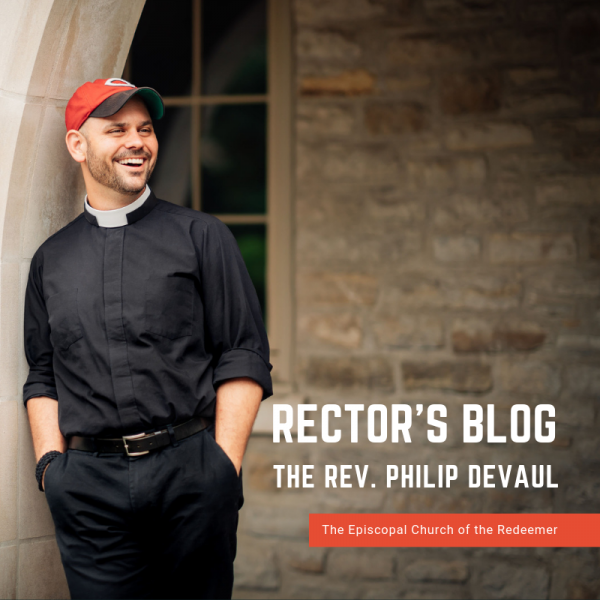Rector's Blog: Closing the Gap

Near the beginning of his ministry in Matthew’s Gospel, Jesus calls his followers together and casts a vision for his whole ministry. Christians often call this The Sermon on the Mount. This sermon, this extended discourse by Jesus, is a defining moment in Jesus’ public life. Taken as a whole, it’s his thesis statement.
Everything Jesus says and does after this moment is like an exclamation point to the words he utters here. Imagine Jesus draws a picture of the world as seen through God’s eyes, and then spends the rest of his life on earth living into that picture – giving it color and texture, volume and dimension.
Jesus says, “Blessed are the poor in spirit” and then we see him bless them in very real and practical ways. He teaches them how to pray, and then his own prayers end up sounding a lot like “thy kingdom come, thy will be done, on earth as it is in Heaven.” Jesus tells them to love their enemies and pray for those who persecute them, to turn the other cheek, to offer even their clothes to those who seek them; and then we see him offer his cheek and allow himself to be stripped and hung on a cross in order that those around him might be loved and forgiven.
Jesus’ vision presents a conundrum for us though.
The conundrum, put simply, is that there is a tremendous gap between the way God sees us and the way we see ourselves.
Jesus points out that we see ourselves as in line with God when we follow the rules. We think that if we do what we are told, everything is fine. We think the quality of life is something that can be measured by the goodness of our actions. In short, we see our belovedness, our belongness, our beauty as directly connected to our ability to achieve the tasks life hands us. So, when God gives us rules and we follow them, we think we’ve done it. We’re good.
In the Sermon on the Mount, Jesus gives us a vision of something much grander. He describes a relationship between God and us that is much more holistic, that encompasses every part of our being. He orients us in the fundamental reality that we belong to God. In our beginning, in our end, and in every moment in between, we belong utterly to God.
Jesus gives a lot of instruction here, but he does not say, “If you do these things, you will belong to God.” Instead he says, “You belong to God: This is what it would look like if you acted as if that were true.” That we don’t act as if we already belong, that we don’t act as if the world and all that is in it belongs utterly to God and is meant to be cherished – well, we know that, don’t we?
This is why Jesus’ vision, his sermon, his thesis statement is so important to us: Jesus is giving us an opportunity to see ourselves the way God sees us. To look at ourselves through the eyes of the One who made us requires honesty and accountability, mercy and understanding. The work of the Church today is to close the gap between how God sees us and how we see ourselves.
This weekend, Church of the Redeemer will have one all-church worship service, followed by our Annual Meeting. This is our opportunity to take stock of the last year and to get a picture of the year ahead. Looking both backward and forward, we are able to see where we are. We are able to examine our vision of the community we believe God is calling us to be, and we get a better sense of the gap between how God sees us and how we are currently seeing ourselves.
In our case, this is not abstract work. We have a clear vision of a worshiping community that knows Jesus and grows in love: United in relationships of holy connection and communion, Growing with people of every age, race, gender, sexual orientation, socio-economic situation, and political persuasion, Inspired by our understanding of why we are Christian, why we are Episcopalian, why Redeemer matters to us, Sent into the world, rooted and grounded in love, to serve all people with humility, compassion, and faithfulness.
And we have put into place a strategic plan that we hope will help us work practically and authentically to live into that vision, the way Jesus lived into the vision he cast. We seek that kind of obedience to God – not the kind that checks boxes. Our obedience begins in our understanding that God has brought us together, God has loved us into being, and God is setting the course for our shared ministry, and then our obedience is to making sure our actions reflect that vision, that we may see ourselves the way God sees us.
I hope you will be with us this Sunday if you’re able. We will be living into God’s vision, and that’s something we do together.